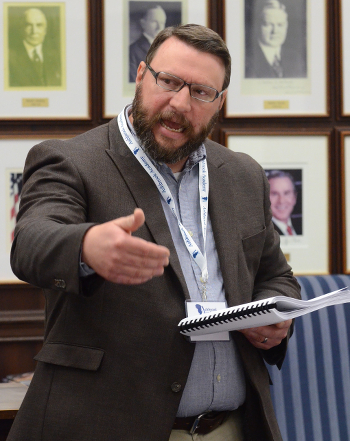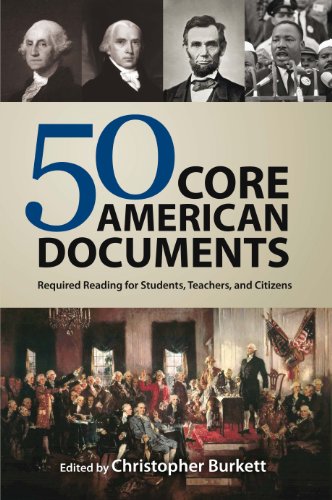
Dr. Christopher Burkett is an Associate Professor of Political Science at Ashland University. He also co-chairs a Master of Arts program in American History & Government. He edited a book on some of America’s most important essays, speeches, Supreme Court cases, etc.
The Ashbrook Center’s 50 Core American Documents collects works from the founding era through mid-twentieth century. Who stimulated such an anthology?
The collection was a natural outgrowth of Ashbrook’s emphasis on teaching through the use of original documents, and arose in part from our use of original documents in the Master of Arts in American History and Government program at Ashland University. In fact, many of our nationally-based faculty recommended documents to be included, from which we chose the fifty included in the published volume.
Justifications for including the Declaration of Independence and Constitution are obvious. Yet some lesser-known titles, private correspondences among them, edged out reputable others. Do you have an unsung favorite? I find James Madison’s piece “Property” to be very interesting and useful. It was a newspaper editorial and hasn’t been widely read over the last fifty years. But it reveals how Madison and others thought about the foundations of liberty and self-government: we have a property in our rights, because each of us has a property in our own free minds and the opinions our minds produce. Reading Madison’s essay “Property” can also enhance our reading of other documents, such as Thomas Jefferson’s Bill for Religious Freedom in Virginia.

Inherent within any list is limitation. What were your selection criteria?
We asked ourselves what’s important in the American story. First of all, what do we believe as Americans? Then we asked: What kind of government did Americans choose to help us live up to those principles? We began by choosing documents that would help us think about those questions. And we didn’t simply choose the most commonly read documents, or documents that would attempt to cover all aspects of American history. Instead we chose documents that would tell our country’s unfolding story of liberty and self-government and reveal something of what Thomas Jefferson called “the American mind.”
Of those excluded which handful merit honorable mentions?
At the top of the list is Dr. Martin Luther King’s Letter from a Birmingham Jail. That great letter would be paired nicely with Malcolm X’s speech “The Ballot or the Bullet?” There are many other documents that deserve to be read, and hopefully many of those will be included in Ashbrook’s supplemental collections of documents covering specific periods and themes in American history and politics.

Just three – a trio of speeches by Martin Luther King Jr., Lyndon Johnson, and Ronald Reagan – are dated after 1960. Why is that?
In many ways these three speeches set the tone and established a kind of framework for public discourse on the meaning of liberty, equality, and democratic self-government from the 1960s to today. In other words, they articulated ideas that generated vigorous debate over the meaning of liberty and equality for the last fifty years. It seemed fitting to end with these documents so readers could consider contemporary issues in light of the ideas in those documents.
Learn more about Christopher Burkett:
- Ashland University (AU) faculty page
- Ashbrook Center faculty page
- List of courses taught at AU
- HistorySpeaks.org audio courses – “A New Nation (1776-1812) and Founding Documents”
- TeachingAmericanHistory.org – “A leading online resource for American History teachers & students”
Dr. Burkett is editor of 50 Core American Documents: Required Reading for Students, Teachers, and Citizens.
Enjoy learning from historians? See our interviews with #1 New York Times bestselling author Larry Schweikart and Reagan biographer Craig Shirley.